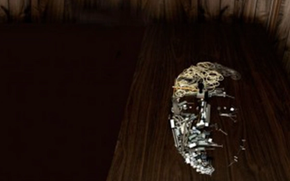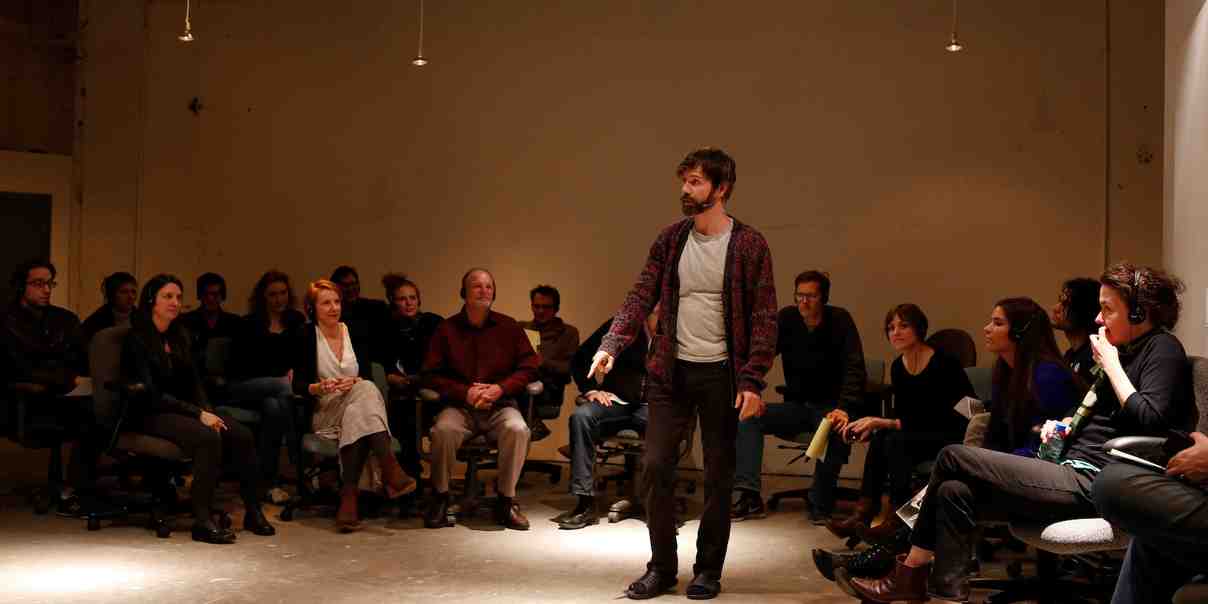

Looking back at Andy Bragen’s 'This is My Office'
Andy Bragen is no stranger to writing shows about himself. Nor is Play Co. a stranger to his work. In 2013 we produced his show This is My Office, which was about his father. The play was a guided tour through an empty office that becomes an unexpected glimpse into Andy’s own past and present as well as his father’s complicated legacy.
It’s a one-person show, with an actor playing Andy. The audience is brought face to face with a narrator who works his way through a story of existential angst, self-doubt, and a doughnut addiction. And it wasn’t exactly the story he set out to tell about himself; but becomes a richer one about family, redemption, and love.
Both Notes on My Mother’s Decline and This is My Office are intimate portrayals of some of the hard questions that come up not only in life, but with one’s family. For Notes on My Mother’s Decline, Andy has said that there are some distinct differences from his prior piece, most of which come from aging and feeling more comfortable in his own identity. When we asked him about it, he said:
“I was writing This Is My Office in my late thirties and I was interested in the question of success versus failure and also my own identity in this world and in the theater as a writer. Also, I was reckoning with the legacy of my father, who he was in relation to who I was, and who I was becoming.”
In the stage directions for This is My Office Andy explains that his character should not be a reliable narrator. “He thinks he’s telling one story, and falls into another. He loses track, and then ‘rights himself’, only to lose track again. He is an unreliable narrator, both for the audience and for himself.” In Notes on My Mother’s Decline, he’s giving us a truthful diary into the process of his mother’s physical decline. His portrait of his mother is a re-telling. This is My Office is a questioning.
But it’s not only the style and the parents that are different; it’s Andy’s character too. To begin with, whereas Notes on My Mother’s Decline features both himself and his mother, This is My Office features only him and the audience he is speaking to: it’s focus is on who “Andy” is, though often in relation to his father. And the character of “Andy” is not always kind to himself. In Notes on My Mother’s Decline his self-portrayal is much more comfortable and kindly reflective of his experience with his mother. But in This is My Office “Andy” is self-deprecating, pointing out what he sees as his worst flaws and describes perhaps his most pathetic moments. And he’s more self-conscious, apologizing to his audience for speaking too much, routinely checking in with them. Maybe it is his manifestation of the frustration and fear he felt within himself for who he is afraid of becoming.
This is My Office is set in his dad’s old office, which he miraculously realizes is the same office he has been given for his artistic residency (remember, he’s an unreliable narrator, though the point isn’t really his physical space). His memories of his father, (and his many flaws and defeats) which he tells throughout, permeate the office and the piece. Through his comparisons between himself and his father he blurs the lines as to who the main character really is. In This is My Office he’s working through his own life and what he perceives to be his failures: as a writer, as a human. He might be in his dad’s office, but more and more it’s his, too. Ultimately, he’s scared of being his dad, or perhaps a worse version of him.
But in Notes on My Mother’s Decline, he isn’t so much exploring himself. Rather, he says that: “With Notes I don’t think I’m as interested in those kinds of questions. I’m interested in bigger questions, I guess, of how we love people and how we deal with people who we’re close to, and what family means.”
And perhaps, what it means to live not only without, but with our families?
Related Productions

Written by
Anisa Threlkeld